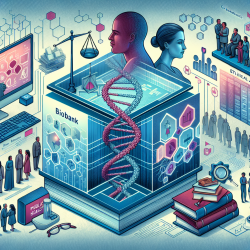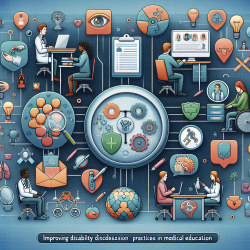The intersection of public health and genomic medicine presents unique ethical challenges, particularly in the context of biobanking. The research article "Biobanking and public health: is a human rights approach the tie that binds?" by Meslin and Garba (2011) offers valuable insights into these challenges and proposes a human rights framework to address them. This blog aims to help practitioners in online therapy, especially those working in special education, enhance their skills by understanding and implementing the outcomes of this research.
Understanding Biobanking and Its Ethical Implications
Biobanking involves the collection and storage of biological samples, such as blood, urine, and DNA, for research purposes. These biobanks are essential for advancing genomic medicine, which aims to provide personalized treatments based on an individual's genetic makeup. However, the ethical principles guiding biobanking often clash with those of public health. While public health focuses on population-based benefits, genomic medicine emphasizes individual autonomy and informed consent.
Human Rights as an Ethical Framework
Meslin and Garba (2011) argue that a human rights approach can bridge the ethical divide between public health and genomic medicine. This approach emphasizes the following principles:
- Informed Consent: Ensuring that individuals are fully informed about how their biological samples will be used.
- Autonomy: Respecting the individual's right to make decisions about their participation in biobanking.
- Privacy: Protecting the confidentiality of individuals' genetic information.
- Equity: Ensuring that the benefits of biobanking are shared fairly among all populations, including marginalized groups.
Practical Applications for Online Therapy Practitioners
Online therapy practitioners, especially those in special education, can apply these ethical principles to enhance their practice. Here are some practical steps:
- Educate Yourself and Your Clients: Stay informed about the ethical implications of biobanking and educate your clients about their rights and the potential uses of their genetic information.
- Implement Informed Consent Processes: Ensure that your clients fully understand the implications of participating in biobanking research. Provide clear and comprehensive information about how their data will be used and stored.
- Advocate for Privacy and Confidentiality: Work to protect your clients' genetic information by advocating for robust privacy protections and secure data storage practices.
- Promote Equity: Advocate for the fair distribution of the benefits of biobanking research, ensuring that marginalized and vulnerable populations are not excluded from the potential benefits.
Encouraging Further Research
While the human rights approach offers a promising framework for addressing the ethical challenges of biobanking, more research is needed to fully understand its implications and to develop practical guidelines for implementation. Practitioners are encouraged to engage in ongoing education and research to stay abreast of developments in this field.To read the original research paper, please follow this link:
Biobanking and public health: is a human rights approach the tie that binds? 









